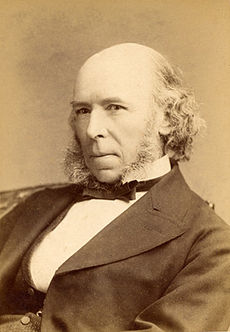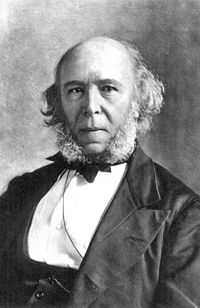- Herbert Spencer
-
Herbert Spencer 
Herbert SpencerFirma Herbert Spencer (Derby, 27 de abril de 1820 - Brighton, 8 de diciembre de 1903) fue un naturalista, filósofo, psicólogo y sociólogo británico. Instauró el Darwinismo social en Gran Bretaña y fue uno de los más ilustres positivistas de su país. Ingeniero civil y de formación autodidacta, se interesó tanto por la ciencia como por las letras.
Desde el punto de vista sociológico cabe considerarle como el primer autor que utilizó de forma sistemática los conceptos de estructura y función. Por otra parte, concibió la sociología como un instrumento dinámico al servicio de la reforma social. Dedicó su vida a elaborar su sistema de filosofía evolucionista, en la que considera la evolución natural como clave de toda la realidad, a partir de cuya ley mecánico-materialista cabe explicar cualquier nivel progresivo: la materia, lo biológico, lo psíquico, lo social, etc.
En sus lecturas conoció la teoría de la evolución expuesta en el siglo XIX por el naturalista Charles Darwin. Su teoría fundacional para la biología moderna sostenía que los organismos biológicos evolucionan adquiriendo nuevos rasgos por adaptación al medio ambiente que se hacen hereditarios. Las teorías de Lamarck sobre la evolución influyeron profundamente en la obra de Spencer.
Para Spencer nada, incluidas las tendencias humanitarias, debe interferir con las "leyes naturales", que implican que el "más apto" es quien sobrevive y los demás perecen. Sin embargo, y a pesar del nombre de sus ideas, Spencer no aceptaba la teoría de Darwin, proponiendo una versión del lamarquismo, de acuerdo a la cual los «órganos» se desarrollan por su uso (o degeneran dado la falta de uso) y esos cambios se transmiten de una generación a otra. Para Spencer, la sociedad es también un organismo, evolucionando hacia formas más complejas de acuerdo a la «ley de la vida», es decir, de acuerdo al principio de la sobrevivencia del más fuerte, tanto a nivel individual como de sociedades. Consecuentemente, Spencer se oponía —radicalmente— a todas las manifestaciones de «socialismo», tales como la educación publica generalizada u obligatoria, bibliotecas publicas, leyes de seguridad industrial, y, en general, a toda legislación o proyecto social.
Aplicó la teoría de la evolución a las manifestaciones del espíritu y a los problemas sociales, entre ellos el de la educación, con su obra Educación: intelectual, moral, física. Su doctrina quedó principalmente expuesta en su Sistema de filosofía sintética (11 volúmenes). De su extensa bibliografía, cabe mencionar: La estática social (1850), Principios de psicología (1855), Primeros principios (1862), Principios de biología (1864), La clasificación de las ciencias (1864), La sociología descriptiva (1873), Principios de sociología (1877-1896) y El individuo contra el Estado (1884). Políticamente, desde la década de 1880 ingresó en la Liberty and Property Defence League, la cual en buena parte estaba influenciada por sus ideas.
Desde el punto de vista sociologico, Spencer la define como "la historia natural de las sociedades", dicho de otro modo: un orden entre los cambios estructurales y funcionales que experimentan las sociedades. La sociologia de Spencer se centra en los fenomenos macrosociales (agregados sociales) asi como en sus funciones.
Varios autores criticaron el a veces extremado realismo de Spencer (por sus semejanzas con el mecanicismo); entre ellos destacó el filósofo y psicólogo escocés Alexander Bain. A pesar de que Spencer no logró crear escuela, su ambicioso intento de sistematizar todo el conocimiento dentro del marco de la ciencia moderna y especialmente en términos de la evolución, le ha hecho merecedor de figurar entre los principales pensadores de finales del siglo XIX.
Contenido
Abreviatura
La abreviatura Spencer se emplea para indicar a Herbert Spencer como autoridad en la descripción y clasificación científica de los vegetales. (Ver listado de especies descritas por este autor en IPNI)
Bibliografía
- Spencer, Herbert. Spencer: Political Writings (Cambridge Texts in the History of Political Thought) editado por John Offer (1993) [1]
- Spencer, Herbert. Social Statics: The Man Versus the State
- Spencer, Herbert. The study of sociology [2]; texto online
- Spencer, Herbert. The Principles of Psychology [3]; texto online
- Spencer, Herbert. Social Statics, Abridged and Revised: Together with the Man Versus the State (1896), texto online
- Spencer, Herbert. Education: Intellectual, Moral, and Physical (1891) 283pp texto online
- Spencer, Herbert. An Autobiography (1905, 2 vol) texto online
- escritos online de Spencer
Referencias
- Carneiro, Robert L. and Perrin, Robert G. "Herbert Spencer's 'Principles of Sociology:' a Centennial Retrospective and Appraisal." Annals of Science 2002 59(3): 221-261 online at Ebsco
- Duncan, David. The life and letters of Herbert Spencer (1908) online edition
- Elliot, Hugh. Herbert Spencer. London: Constable and Company, Ltd., 1917
- Elwick, James. "Herbert Spencer and the Disunity of the Social Organism." History of Science 41, 2003, pp. 35–72.
- Elliott, Paul 'Erasmus Darwin, Herbert Spencer and the origins of the evolutionary worldview in British provincial scientific culture', Isis 94 (2003), 1-29
- Francis, Mark, Herbert Spencer and the Invention of Modern Life. Newcastle UK: Acumen Publishing, 2007 ISBN 0-8014-4590-6
- Harris, Jose. "Spencer, Herbert (1820–1903)", Oxford Dictionary of National Biography,(2004) online, a standard short biography
- Hofstadter, Richard, Social Darwinism in American Thought. Boston: Beacon Press, 1955.
- Kennedy, James G. Herbert Spencer. Boston: G. K. Hall & Co., 1978
- Lightman, Bernard, The Origins of Agnosticism: Victorian unbelief and the limits of knowledge. Baltimore: Johns Hopkins University Press, 1987.
- Mandelbaum, Maurice, History, Man, and Reason : a study in nineteenth-century thought. Baltimore: Johns Hopkins University Press, 1971.
- Rafferty, Edward C.; “The Right to the Use of the Earth.,” Herbert Spencer, the Washington Intellectual Community, and American Conservation in the Late Nineteenth Century.
- Richards, Robert J. Darwin and the Emergence of Evolutionary Theories of Mind and Behavior Chicago: University of Chicago Press, 1987.
- Taylor, Michael W., Men versus the State: Herbert Spencer and Late Victorian Individualism. Oxford: Oxford University Press, 1992.
- Taylor, Michael W., The Philosophy of Herbert Spencer. London: Continuum, (2007)
- Three Initiates (1912). The Kybalion. Chicago: The Yogi Publication Society/Masonic Temple.
- Turner, Jonathan H., Herbert Spencer: A Renewed Appreciation. Sage Publications, Inc., 1985. ISBN 0-8039-2426-7
- Versen, Christopher R., Optimistic Liberals: Herbert Spencer, the Brooklyn Ethical Association, and the Integration of Moral Philosophy and Evolution in the Victorian Trans-Atlantic Community. Florida State University, 2006.
- Papers of Herbert Spencer en la Biblioteca del Senado, Universidad de Londres
- Mayoría de los textos de Spencer disponibles online
- "On The Proper Sphere of Government" (1842)
- Social Statics: or, The Conditions Essential to Human Happiness Specified, and the First of Them Developed (1851)
- "The Right to Ignore the State", Cap. XIX de la 1ª ed. de Social Statics
- Social Statics: Abridged and Revised (1892)
- "A Theory of Population" (1852)
- Principles of Psychology (1855), 1ª ed. en un vol.
- Education (1861)
- System of Synthetic Philosophy',' en diez vols.
- First Principles ISBN 0-89875-795-9 (1862)
- Principles of Biology (1864, 1867; revised and enlarged: 1898), en dos vols.
- Volumen I — Parte I: The Data of Biology; Parte II: The Inductions of Biology; Parte III: The Evolution of Life; Appendices
- Volumen II — Parte IV: Morphological Development; Parte V: Physiological Development; Parte VI: Laws of Mutiplication; Appendices
- Principles of Psychology (1870, 1880), en dos volumenes
- Volumen I — Parte I: The Data of Pscyhology; Parte II: The Inductions of Pscyhology; Parte III: General Synthesis; Parte IV: Special Synthesis; Parte V: Physical Synthesis; Appendix
- Volumen II — Parte VI: Special Analysis; Parte VII: General Analysis; Parte VIII: Congruities; Parte IX: Corollaries
- Principles of Sociology, en tres volumenes
- Volumen I (1874-75; enlarged 1876, 1885) — Parte I: Data of Sociology; Parte II: Inductions of Sociology; Parte III: Domestic Institutions
- Volumen II — Parte IV: Ceremonial Institutions (1879); Parte V: Political Institutions (1882); Parte VI [publicado aquí en algunas ediciones]: Ecclesiastical Institutions (1885)
- Volumen III — Parte VI [published here in some editions]: Ecclesiastical Institutions (1885); Parte VII: Professional Institutions (1896); Parte VIII: Industrial Institutions (1896); Referencias
- The Principles of Ethics (1897), en dos volumenes
- Volumen I — Parte I: The Data of Ethics (1879); Parte II: The Inductions of Ethics (1892); Parte III: The Ethics of Individual Life (1892); References
- Volumen II — Parte IV: The Ethics of Social Life: Justice (1891); Parte V: The Ethics of Social Life: Negative Beneficence (1892); Parte VI: The Ethics of Social Life: Positive Beneficence (1892); Apendices
- The Study of Sociology (1873, 1896)
- An Autobiography (1904), en dos volumenes
- Ver también Spencer, Herbert (1904). An Autobiography. D. Appleton and Company. http://books.google.com/books?id=gUozqCwTGkEC&printsec=frontcover&dq=herbert+spencer&as_brr=1#PPR3,M2.
- v1 Life and Letters of Herbert Spencer por David Duncan (1908)
- v2 Life and Letters of Herbert Spencer por David Duncan (1908)
- Descriptive Sociology; or Groups of Sociological Facts, partes 1-8, clasifiado y arreglado de Spencer, compilado y resumido por David Duncan, Richard Schepping, y James Collier (London, Williams & Norgate, 1873-1881)
Colecciones de Ensayos:
- Illustrations of Universal Progress: A Series of Discussions (1864, 1883)
- The Man Versus the State (1884)
- Essays: Scientific, Political, and Speculative (1891), en tres volumenes:
- Volumen I (includes "The Development Hypothesis," "Progress: Its Law and Cause," "The Factors of Organic Evolution" and others)
- Volumen II (includes "The Classification of the Sciences," The Philosophy of Style (1852), The Origin and Function of Music," "The Physiology of Laughter," y otras)
- Volumen III (includes "The Ethics of Kant," "State Tamperings With Money and Banks," "Specialized Administration," "From Freedom to Bondage," "The Americans," y otras)
- Various Fragments (1897, agrandado en 1900)
- Facts and Comments (1902)
Críticas filosóficas
- Herbert Spencer: An Estimate and Review (1904) por Josiah Royce.
- Lectures on the Ethics of T.H. Green, Mr. Herbert Spencer, and J. Martineau (1902) por Henry Sidgwick.
- A Few Words with Mr Herbert Spencer (1884) por Paul Lafargue
- A Perplexed Philosopher (1892) por Henry George
- Spencer-smashing at Washington (1894) por Lester F. Ward
Enlaces externos
- «Herbert Spencer», Índice Internacional de Nombres de las Plantas (IPNI), Real Jardín Botánico de Kew, Herbario de la Universidad de Harvard y Herbario nacional Australiano (eds.), http://www.ipni.org/ipni/authorsearch?id=30467-1&query_type=by_id&output_format=object_view
 Wikiespecies tiene un artículo sobre Herbert Spencer. Wikispecies
Wikiespecies tiene un artículo sobre Herbert Spencer. Wikispecies Wikimedia Commons alberga contenido multimedia sobre Herbert SpencerCommons.
Wikimedia Commons alberga contenido multimedia sobre Herbert SpencerCommons. Wikiquote alberga frases célebres de o sobre Herbert Spencer. Wikiquote
Wikiquote alberga frases célebres de o sobre Herbert Spencer. Wikiquote Wikisource contiene obras originales de o sobre Herbert Spencer.Wikisource
Wikisource contiene obras originales de o sobre Herbert Spencer.Wikisource
 Wikimedia Commons alberga contenido multimedia sobre Herbert SpencerCommons.
Wikimedia Commons alberga contenido multimedia sobre Herbert SpencerCommons.
Categorías:- Botánicos con abreviatura de autor
- Nacidos en 1820
- Fallecidos en 1903
- Antropólogos del Reino Unido
- Botánicos del Reino Unido
- Algólogos del Reino Unido
- Autodidactas
- Filósofos del Reino Unido
- Georgistas
- Liberales del Reino Unido
- Psicólogos del Reino Unido
- Sociólogos del Reino Unido
- Racismo
- Agnósticos
- Agnósticos de Inglaterra
Wikimedia foundation. 2010.

